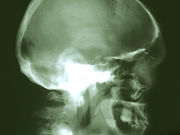Screening detects nasopharyngeal carcinoma significantly earlier; linked to better outcomes
WEDNESDAY, Aug. 9, 2017 (HealthDay News) — Analysis of Epstein-Barr virus (EBV) DNA in plasma samples can identify early asymptomatic nasopharyngeal carcinoma, according to a study published in the Aug. 10 issue of the New England Journal of Medicine.
K.C. Allen Chan, M.B.B.S., from the Li Ka Shing Institute of Health Sciences in Hong Kong, and colleagues analyzed EBV DNA in plasma specimens to screen 20,174 participants without symptoms of nasopharyngeal carcinoma.
The researchers found that EBV DNA was detectable in plasma samples from 5.5 percent of participants. Overall, 1.5 percent of all patients and 27.8 percent of those who initially tested positive had persistently positive results on the repeated sample four weeks later. Of the 309 patients with persistently positive results, 300 underwent endoscopic examination and 275 also underwent magnetic resonance imaging; 34 of these participants had nasopharyngeal carcinoma. Compared with a historical cohort, a higher proportion of participants with nasopharyngeal carcinoma who were identified by screening had stage I or II disease (71 versus 20 percent) and had superior three-year progression-free survival (97 versus 70 percent). Only one participant with negative EBV DNA in plasma samples developed nasopharyngeal carcinoma within one year after testing. The sensitivity and specificity of EBV DNA in plasma samples was 97.1 and 98.6 percent, respectively.
“Analysis of EBV DNA in plasma samples was useful in screening for early asymptomatic nasopharyngeal carcinoma,” the authors write. “Nasopharyngeal carcinoma was detected significantly earlier and outcomes were better in participants who were identified by screening than in those in a historical cohort.”
Several authors disclosed financial ties to the pharmaceutical industry and/or hold provisional patents.
Copyright © 2017 HealthDay. All rights reserved.








